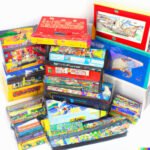Introduction
Board games provide entertainment for individuals and groups of all ages. Games for those aged 8 and up are especially varied, ranging from strategic board games to cooperative games to simplified versions of classic board games. Some popular single-player strategy board games suitable for children aged 8 and up include checkers, Go, chess, and Nine Men’s Morris. These classic board games help children understand the basics of tactical thinking by mastering simple strategies that can be reapplied to more complicated scenarios.
For cooperative play, team-based tabletop war gaming is a popular genre of game among children aged 8 and up. This type of game introduces players to challenging adventures where players must work together to complete objectives. Many fantasy-themed war gaming systems are geared towards younger players in this age range; these typically offer an easy learning curve or simplified rule set while still providing an immersive and engaging experience.
A selection of classic board game favorites have also been adapted into simplified versions that can be enjoyed by children as young as 8 years old. Titles such as Monopoly Junior, Sorry! Sliders, The Settlers of Catan Junior Edition, and Game of Life Jr., provide nostalgic fun tailored to match the abilities of younger gamers. When used judiciously, these simplified renditions can serve as excellent learning tools for introducing basic aspects such as probability theory or resource management.
Board games have long been known to be highly entertaining educational tools if played with the right group at the right time. Whether it is tactical strategy lessons offered by Checkers or monopoly or cooperative adventure quests in tabletop gaming systems”such as Dungeons & Dragons”board games designed for kids 8 and above provide both enjoyable playtime experiences AND teach valuable life skills such as resource management, problem solving, critical thinking, and communication along the way!
Educational Benefits of Board Games for 8 and Up
Board games are a great way to teach children 8 and up the vital skills they need to succeed and develop in the classroom. At this age, board games can help shape children’s problem-solving skills and allow them to analyze different situations. Puzzles are a great way to empower young minds to practice step-by-step thinking, problem deciphering and predicting how each action will affect future results. Board games can also help develop active listening skills as players turn by turn must listen carefully to one another for strategizing purposes. Overall board games can be an effective teaching tool used to reinforce the basics of logic, strategy, communication, relationship building and problem solving!
Adventure Games for 8 and Up
Adventure Games for 8 and Up can take many forms, all of which share a common theme, the challenge they present to players: an exciting journey with obstacles and surprises. This can range from a pirate-themed treasure hunt with secret maps, treasure chests full of puzzles to solve, or clues hidden in different levels or locations; to a scavenger hunt where teams have to locate items through observation, research and problem solving; or even a combination of both, creating an epic journey across the globe. There are even horror-themed adventure games designed for 8 and up ” full of mysteries, puzzles, riddles, and spooky creatures ” that bring out the thrill seeker in everyone! Whatever the game is designed to do ” escape rooms included ” it’s sure to be enthralling and captivate players from the start.
Creating a Positive Board Game Environment
1. Choose the right game: When selecting a board game, it is important to know your child’s interests and ability levels. Many games are too difficult for children 8 and up, so look for ones that have simple rules but still get them thinking.
2. Explain the rules: Before you begin playing, it is essential to clearly explain all of the details of the game so everyone can understand how it works. Make sure each player understands their turn order, objective and any special pieces they may need while playing.
3. Model good behavior: As with any activity, the adults should lead by example in how to handle mistakes or even boredom when playing the game. Celebrate successes with high fives and remind them that having fun and practicing patience is part of the process.
4. Offer help if needed: Children may be able to play certain games independently, but at this age most games involve collaboration between players. Help facilitate discussion between players but try not too interfere too much ” children should learn how to work through difficult areas on their own by forming strategies and making decisions together when needed.
5. Take breaks: If needed, pauses are allowed during gameplay as long as they don’t interrupt the flow of a match too often ” remember to offer drinks or snacks during these times! Finally, end with a shared snack or treat to close out the evening on a happy note!
Choosing the Right Game
Selecting the right board game for 8 and up is essential for creating a fun, rewarding experience. Before deciding on the game to play, consider factors such as the difficulty level of the game and its content appropriateness.
For an appropriate level of challenge, start by considering the age range of players. Games with a high complexity level may be too difficult for 8 year olds, while those intended for younger children may not provide enough challenge to keep older players engaged. Look at reviews or ask other people who have played similar board games to get an idea of the best difficulty level for your combined age range.
Check out what type of game pieces are included as well. Some puzzle-type games may require patience, strategizing and problem solving skills that involve intricate pieces that can easily break or go missing if handled improperly by small hands. Smaller pieces can also present choking hazards for very young players. If a particularly challenging game seems fun but comes with complex pieces, find an alternative version using large durable pieces that adults and children can both handle comfortably.
Finally, make sure any included video clips, artwork or text messages contain appropriate content that parents find suitable for their kids; some adults may want to avoid certain topics”like war-based themes or violence”in order to foster positive learning experiences rather than promote negative ones.
Conclusion
Board games are great for 8 and up because they provide a fun and engaging way to develop social skills, critical thinking, creative problem-solving, resilience, patience and teamwork. These experiences can help children become more independent as well as better prepared for the challenges of life. Board games can also help bring families together as they work together to win the game. Kids can get social interaction and learn valuable lessons about rules, cooperation and how good sportsmanship is important in everything people do. Additionally, board games are inspiring as they allow kids to use their imagination and explore new worlds or escape the ordinary. Board games offer an ever-changing setting for learning and childlike wonder that can last far beyond childhood into adulthood.

I love playing all kinds of games – from classics like Monopoly to modern favourites like Ticket to Ride.
I created this blog as a way to share my love of board games with others, and provide information on the latest releases and news in the industry.





